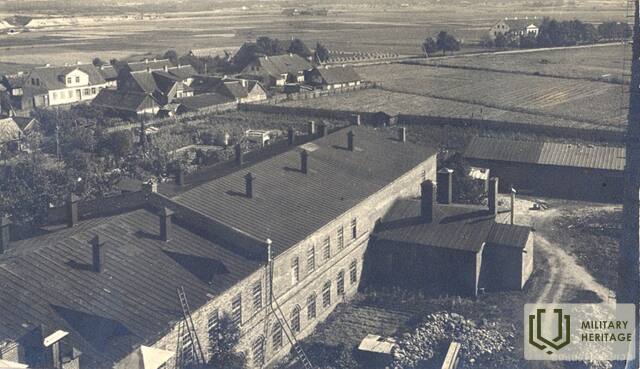Former woodworking plant "Vulkāns"
A powerful factory with a rich history dating back to 1878.
Walking along the trail today, it is hard to imagine that a mighty factory with a rich history was located on its edge. In the mid-19th century, Sweden managed to produce relatively safe matches that did not ignite at the slightest friction. In 1878, a Jewish businessman living in Kuldīga, Louis A. Hirschman, established the Kuldīga Match Factory, which became known for its recipe for a safe match ignition mass, and in different colors - red and yellow. Until 1930, a deer was printed on the labels of matchboxes, because the owner's surname "Hirsch" means deer in German. The factory expanded, was modernized with new equipment, and a branch was opened in Saldus. Already in 1890, matches were exported to the USA, Iran, Afghanistan, China and Japan. By 1901, the company's products had won 11 gold and 5 silver awards. During World War I, the company's operations stopped, but the workbenches were evacuated to Russia. In the interwar period, the factory was rebuilt into a plywood factory, and in the 1930s it became one of the most modern plywood factories in Europe. The products were exported to Western European countries. In 1940, the company was nationalized. As a result of the crisis caused by World War II, the production volume decreased. During World War II, the factory premises were used for military purposes, but after the war, the factory was a German prisoner of war camp until 1949. Prisoners of war were employed in preparing logs in the forest, in the production process, and in other work. At the end of 1944, when the German army retreated, the newest factory machines were dismantled for export to Germany, electric motors, gearboxes, and other valuable parts were removed. However, the workers had cleverly placed the most worthless parts in the boxes intended for removal. This was the reason why production at the factory was soon able to resume after Germany's capitulation. During the Soviet occupation, “Vulkāns” produced various products – plywood, outer casings for radio receivers, “Estonia” piano cases, kitchen equipment, school furniture and much more. In the eighties and nineties, the company's operations were hampered by delays in the supply of consumables and refusals to cooperate, and the company languished. In 2000, a fire broke out at “Vulkāns”, and two years later, JSC “Vulkāns” was declared insolvent. In 2010, JSC “Vulkāns” was liquidated. As a result of its long-term operation, huge fields of waste and sawdust had accumulated on the banks of the Venta. Today, they have been removed and the riverbank has been tidied up.
Woodworking plant "Vulkāns" [online]. [Accessed 24.05.2024]. Available: https://industria.lndb.lv/companies/22/history









